Friday, December 11, 2015, Paris – Bonjour! While we were enjoying dinner in Paris last night, negotiators at Le Bourget worked hard all night long, not relenting until nearly 7:00 AM this morning in an attempt to move the COP21 agenda to completion. The word we are getting is that while substantial progress continues, the tough issues of a target temperature rise (somewhere between 1.5o and 2.0o C), what transfer of resources between rich and poor countries and for low-lying countries will be included and how goals and accountability for emissions in the future will be handled and improved.
The overall feeling at Le Bourget is one of optimism, but indications are that negotiations will not end on schedule today but will run at least into Saturday and perhaps even longer.
Following is a good recent summary from the Associated Press:
New draft climate deal emerges as Paris talks near end
By KARL RITTER and SYLVIE CORBET
Associated Press
LE BOURGET, France (AP) - Negotiators from China, the U.S. and other nations haggled into the early morning Friday over how to share the burden of fighting climate change and paying for a trillion-dollar transition to clean energy on a global scale.
Some delegates said an elusive climate pact was in sight heading into the final scheduled day of talks outside Paris while others said a new draft presented late Thursday by French Foreign Minister Laurent Fabius allowed rich nations to shift the responsibility of fighting global warming to the developing world.
"We are going backwards," said Gurdial Singh Nijar of Malaysia, the head of a bloc of hardline countries that also includes India, China and Saudi Arabia.
They have put up the fiercest resistance against attempts by the U.S., the European Union and other wealthy nations to make emerging economies pitch in to reduce global greenhouse gas emissions and help the poorest countries cope with climate change. The issue, known as "differentiation" in United Nations climate lingo, was expected to be one of the last to be resolved.
U.S. Secretary of State John Kerry zipped in and out of negotiation rooms as delegates broke into smaller groups overnight to iron out their differences.
"We're working on it," Kerry said as he emerged from one meeting room with an entourage of security agents and State Department aides.
Nijar said it was unreasonable to expect countries like Malaysia to rapidly shift from fossil fuels - the biggest source of man-made greenhouse gas emissions - to cleaner sources of energy.
"We cannot just switch overnight ... and go to renewables," he said, on a coffee break between meetings at 1:30 a.m. "If you remove differentiation you create very serious problems for developing countries."
Diplomats from 196 governments are trying to forge a global pact in Paris to slow global warming by collectively slashing emissions. It's the first time all countries are expected to pitch in - the previous emissions treaty only included rich countries.
The 27-page draft - two pages shorter than a previous version - included a long-term goal of keeping global warming "well below" 2 degrees Celsius (3.6 degrees F), while pursuing efforts to limit the temperature rise to 1.5 degrees C.
The draft also said governments would aim to peak the emissions of heat-trapping greenhouse gases "as soon as possible" and strive to reach "emissions neutrality" by the second half of the century.
That was weaker language than in previous drafts that included more specific emissions cuts and timeframes. Emissions neutrality wasn't defined in the text. Previous versions have included similar terms that are generally understood to mean no more emissions than the Earth can naturally absorb.
The issue appeared far from settled, however, with one negotiator from a developed country saying his delegation would "push back" on the long-term goal. He spoke on condition of anonymity because the talks were ongoing.
"I think, I hope that by the end of this night we'll have a draft of the final text," Fabius said. "We are much closer."
The biggest challenge is to define the responsibilities of wealthy nations, which have polluted the most historically, and developing economies including China and India where emissions are growing the fastest.
That draft suggested compromises were emerging in some sections. But the text still contained competing options on the key issue of transparency - making sure countries follow through on their emissions targets.
That section included an option asking for different rules for rich and poor countries, which the former have said is unacceptable.
"Reporting and verification of emissions is the heart of a strong agreement and will clearly be the last thing decided," said Paul Bledsoe, former Clinton White House climate adviser.
More than 180 countries presented plans to cut or curb their emissions before the conference, and negotiators are discussing ways to anchor those pledges in the agreement.
Several options remained on the contentious issue of financing to help poor and vulnerable countries such as small island nations cope with climate change. Western countries want advanced developing economies such as China and oil-rich Arab countries to pitch in. The new draft said other countries could join the donor base "on a voluntary, complementary basis."
The draft didn't resolve how to deal with demands from vulnerable countries to deal with unavoidable damage from rising seas and other climate impacts. One option said such "loss and damage" would be addressed in a way that doesn't involve liability and compensation - a U.S. demand.
Some environmental advocates rejected the draft as too weak to make a real difference in fighting climate change while other said important progress was made.
"Of course differences remain, but it's clear that the countries here are very, very serious about the challenge before them," said Nat Keohane of the Environmental Defense Fund. "There is strong momentum as we head to the finish line."
The talks have previously been guided by a goal to limit warming to 2 degrees C, compared with preindustrial times. Small island nations at risk of being inundated by rising seas have been pushing for lowering that goal to below 1.5 degrees C in the Paris agreement. Temperatures have already risen by 1 C (1.8 F) since the 19th century, when Western nations started to industrialize and burning fossil fuels on a large scale.
Marshall Islands Foreign Minister Tony de Brum was satisfied that the 1.5 degree target was reflected in the draft.
"With this, I would be able to go home and tell my people that our chance for survival is not lost," he said.
However, scientific analyses show the emissions targets that more than 180 countries have presented won't be enough to limit warming even to 2 degrees C. The draft invited governments to "update" their emissions targets every five years, but didn't require them to improve them.
Associated Press writers Angela Charlton, Matthew Lee, and Seth Borenstein contributed to this report.
Below is a good graphic that describes this progress:
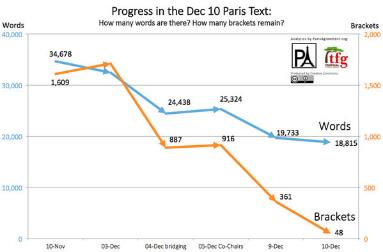
We have fallen into a routine starts with the 30-minute train ide (RER) to Le Bourget in the morning, coming back also via train to the hotel after dark and then walking around for a while before having dinner. Believe it or not, this is really hard work. For the last several days, we have alternated between manning our CCA booth in the Green Zone and attending side events, press conferences and watching a few films in both the Green and Blue Zones. Our group is down to the hard core now, just Tom and Jane Kelly, Shirley and myself. The others have gone home or enjoying other travels outside Paris.
It doesn’t seem so long, but it’s been over 20 years since we were last in Paris. Even in the winter, the streets are crowded with people all day and late into the night, when the younger crowd takes over. Paris has to be one of the most walkable cities in the world; in fact it is a city of walkers and transit riders, probably the reason you seldom see an overweight person -- something you would never see in the United States.
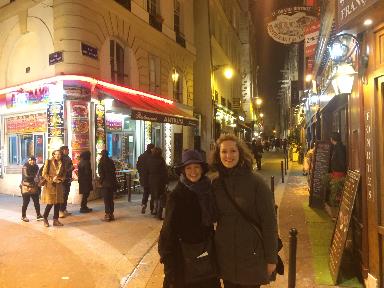
Walkable Paris
On the other hand, Paris is also a city of smokers. Thankfully, smoking has been banned inside bars and restaurants since we were last here, but the attractive outdoor sidewalk seating areas are always totally filled with smokers.
Yesterday, Thursday, December 11, I took an opportunity, for the first time, to sit in on a plenary session of the COP in the main auditorium in the Blue Zone. It was interesting from the standpoint of seeing where the decisions are finalized, but it was mostly “consent calendar” items so not exactly exciting.
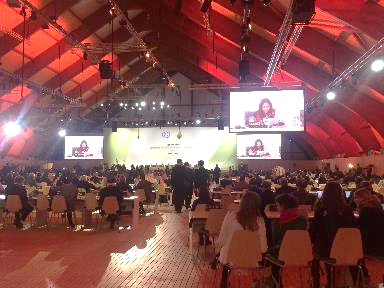
Plenary Session
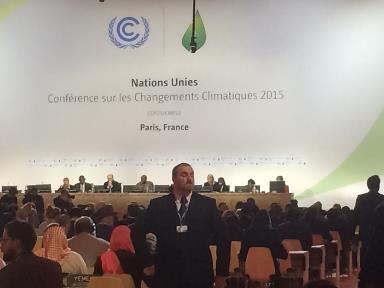
The head table
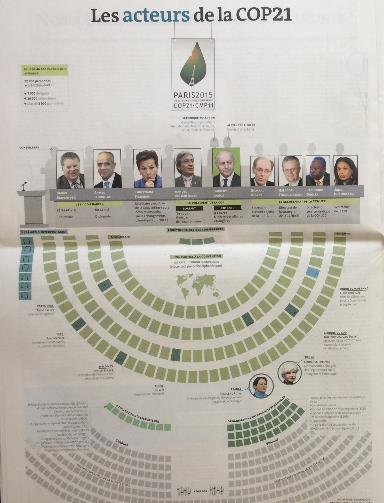
Schematic layout of the hall
I keep running into other Californians; yesterday it was California Senator Bob Wieckowsky whose District straddles 880 south of Oakland. Andy Katz, EBMUD board member stopped by our booth; he is with a large Sierra Club contingent here in Paris. A couple of days ago I was in a side event with Jack Broadbent, executive director of the BAAQMD
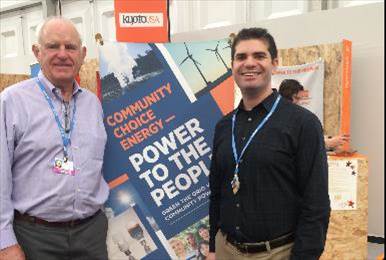
Tom Butt and Any Katz
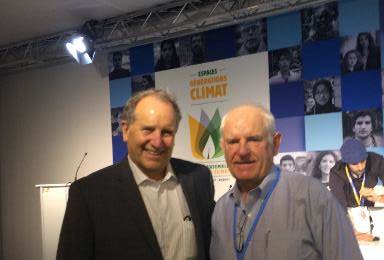
Jack Broadbent and Tom Butt
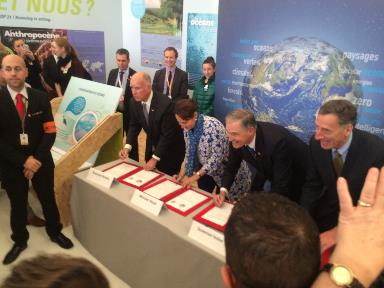
Jerry Brown signing an MOU with governors from Vermont and Washington
Veolia, which operates our Richmond wastewater system is a French company, and we had drinks last night with their Africa, Middle East and South America marketing manager, Jean-Michel Tiberi.
Wednesday was the only day I haven’t been at Le Bourget. Instead, I attended the Sustainable Innovation Forum, in another nearby suburb at Stade de France. It is a big business related event, described as follows:
The Sustainable Innovation Forum is an annual event brought to you by Climate Action & UNEP. Established in 2007 and headquartered in London, UK, Climate Action has, for the last eight years, worked in a unique, contractual partnership with the United Nations Environment Programme (UNEP) – the world’s foremost body on environmental protection and stewardship.
Climate Action establishes and builds partnerships between business, government and public bodies to accelerate international sustainable development and advance the ‘green economy’. We do this by providing a global media and events platform across which stakeholders can share knowledge, technologies and expertise, and identify innovative solutions to the challenges faced by climate change and a growing population.
For our partners and supporters we help engage the private sector, bringing innovations, technologies and finance to the debate. For our clients we help generate profitable business opportunities and partnerships, provide top-level access to emerging markets and reinforce their commitment to, and their position as leaders within, the global sustainability industry.
It was interesting from the standpoint of seeing how multinationals are taking climate change seriously, but clearly most were also interested in how to make a buck from it, and there was also a lot of greenwashing going on, like the Coca Cola booth bragging about how much they had reduced water consumption in manufacturing their unhealthy product.
On Wednesday evening, December 10, our friend, Carolin Bellstedt, arrived via train from Amsterdam and had dinner with us. Carolin is a cousin of an old Vietnam army buddy of mine, Bernard Horstmann, and she spent half a year with us in Richmond in 2012 while interning at Republic Services as their sustainability consultant. She just finished a Master’s Degree in Industrial Ecology and is looking for a job.
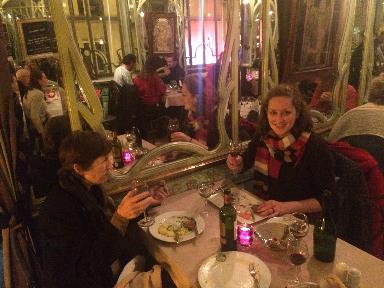
Shirley and Carolin
The only day off we have had as last Sunday, December 6. After pressing the send button on Report from Paris Part 3, we took the Metro to L’Arc de Triomphe and spent the entire afternoon walking, first down the Champs Elysees, through La Place de la Concorde and Les Tuileries almost to La Bastille, then back across the Seine to our hotel. Christmas and whatever other holidays people choose to celebrate here are big business. There was a Christmas themed temporary village of shops and food stands installed along the entire lower half of the Champs Elysees.
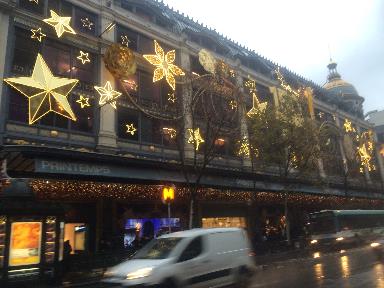
Paris decorated for Christmas
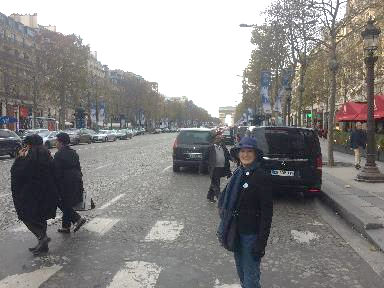
Le Champs Elysees
We have tomorrow, Saturday, free, and then we fly home Sunday morning. This will probably be my last report, and the main takeaway I can leave with is the excitement of being a participant in a worldwide movement at the “subnational” (COP-speak) level. Virtually every event we go to emphasizes the critical role for cities and mayors in stopping global warming, adaptation and resilience.
Au revoir!
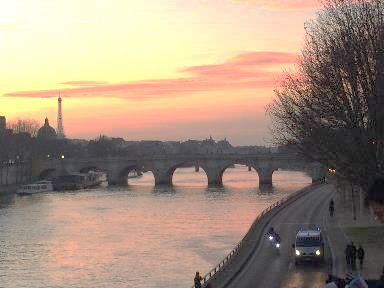
Sunset over the Seine
|

